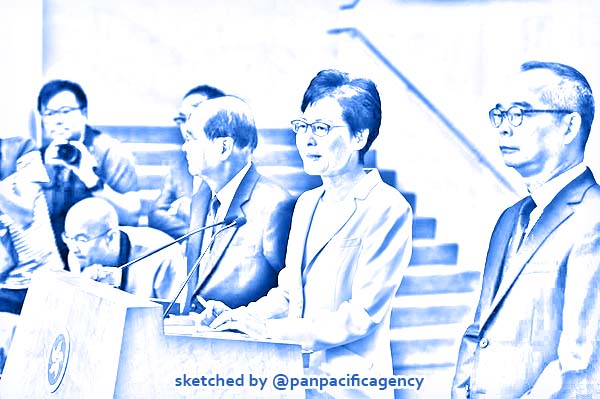Hong Kong leader says she will not hand pick judges for national security cases

Chief Executive of China's Hong Kong Special Administrative Region (HKSAR) Carrie Lam speaks during a media session in Hong Kong, south China, Sept. 5, 2019. (Xinhua/Liu Dawei). Sketched by the Pan Pacific Agency.
HONG KONG, Jun 23, 2020, Reuters. Hong Kong leader Carrie Lam said on Tuesday (June 23) she will not hand pick judges to preside over cases brought under the city’s new security law, an apparent attempt to assuage concerns about the controversial legislation, The Straits Times reported.
Lam said that, as chief executive, she would instead appoint a panel of judges for all courts based on recommendations from a judicial body.
“When one day there is national security cases, the responsibility to assign which judge on that list to handle a case still lies on the judiciary of Hong Kong,” Lam told reporters on Tuesday. “The Executive is not responsible for that.”
The planned national security law has stoked fears among democracy activists in Hong Kong and some foreign governments that Beijing is further eroding extensive autonomy promised when Britain handed it back to China under a “one country, two systems” formula in 1997.
The city’s common law-based legal system is widely seen as the bedrock of that formula, underpinning its status as a global financial hub.
China says the national security law, which is expected to be passed next week, will target only a small group of troublemakers as it tackles separatism, subversion, terrorism and foreign interference in Hong Kong.
However, the full details of the legislation have not been made public and Lam acknowledged on Tuesday she also is yet to view the entire document.
Reports in Chinese state media over the weekend had suggested Lam could select judges for related cases, triggering alarm among some lawyers who called it a serious challenge to Hong Kong’s coveted judicial independence.
Critics have also raised concerns that the law will exclude foreign judges, commonly used in Hong Kong, from presiding over national security cases.
The fear is that could leave judges more favourable to Beijing to handle those cases. “In the released details of the legislation, the problem concerning nationality of judges handling national security cases is not yet mentioned,” Lam said.
The top decision-making body of China’s parliament has scheduled another meeting for June 28-30 and the law, which will pave the way for the biggest change to the city’s way of life, is expected to be enacted then.